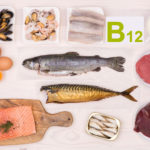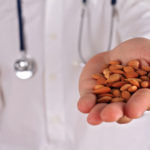Dr. Weil’s Guide To B Vitamins

The B vitamins are a class of water-soluble nutrients that play an important role in maintaining normal physiologic and metabolic functions. In all, there are eight individual members of the B family that are commonly referred to as B-complex. Although each B vitamin is unique, they have closely interrelated functions. The body does not store B vitamins well, and the need for them is increased by stress, smoking, use of alcohol and drugs, unhealthy dietary practices, shift work, illness, and demanding travel schedules.
The B vitamins play important roles in energy production, the synthesis and repair of DNA and RNA, and carbohydrate, protein and fat metabolism. They may also help calm and maintain a healthy nervous system, and can be important in the maintenance of healthy skin and muscle tone.
Vitamin B Food Sources
Animal-derived foods and meat are major sources of several of the B vitamins, for example: poultry, liver, fish, shellfish, and eggs. Vitamin B12, for instance, is only found in animal products. Plant sources of B vitamins include whole grains, potatoes, beans, and lentils. Green leafy vegetables are particularly high in folate (vitamin B9), while biotin (vitamin B7) is found in small amounts in a wide variety of foods, including eggs, pork and leafy greens.
Vitamin B Deficiency
Even in developed countries it is possible to become deficient in one or more of the B vitamins, which can result in deficiency symptoms or disease. For example, a vitamin B6 deficiency can cause depression and swelling of the tongue, while a vitamin B12 deficiency can produce a type of anemia, fatigue, and memory and cognitive impairment. Symptoms of biotin deficiency, although rare, might include dry skin, brittle nails, hair loss, and fatigue.
The B Vitamins:
- Vitamin B1 – Thiamin
- Vitamin B2 – Riboflavin
- Vitamin B3 – Niacin
- Vitamin B5 – Pantothenic Acid
- Vitamin B6 – Pyridoxine
- Vitamin B7 – Biotin
- Vitamin B9 – Folic Acid Or Folate
- Vitamin B12 – Cobalamin
Too Much Vitamin B
Although most B vitamins are eliminated in the urine, if taken in excess some can present problems. For example, high doses of niacin (vitamin B3) – more than 2-3 grams per day – is sometimes used to help lower cholesterol, yet can cause nausea, jaundice, and elevated liver enzymes. These typically disappear once niacin is discontinued. Too much pyridoxine (vitamin B6) can be toxic, resulting in numbness, tingling, and even nerve damage. The current recommended maximum daily intake for B6 is 100 mg. Findings from a recent study suggest that men who take high does of vitamin B6 or vitamin B12 may be at increased risk of lung cancer, especially those who smoke. Is it possible to take too much vitamin B12?
B Vitamins In Supplements
If you choose to supplement, there is no reason not to take the whole complex of eight B vitamins in supplement form, but also no reason to take them apart from a daily multivitamin / multimineral supplement. Multivitamins commonly contain the full spectrum of B vitamins. There are also instances where taking additional individual B vitamin may be appropriate. For example, vitamin B12 may be useful for those who use stomach-acid controlling drugs, including H-2 blockers and proton-pump inhibitors, or who take Metformin to treat type 2 diabetes. Consult with your doctor before beginning any new supplements.
Additional B Vitamin Resources:
Infographic:
Photo Gallery:
How To Get B Vitamins From The Foods You Eat
E-Book:
Videos:
Best Food Sources Of Vitamin Bs
Best Vegetarian B Vitamin Foods
Reviewed by Michael Colangelo, M.S. and Russell Greenfield, M.D. on October 29th, 2017.
Sources:
B Vitamins and the Brain: Mechanisms, Dose and Efficacy-A Review, by David O. Kennedy, Brain, Performance and Nutrition Research Centre, Northumbria University, Newcastle-upon-Tyne NE1 8ST, UK; [email protected] Published: 28 January 2016
Long-Term, Supplemental, One-Carbon Metabolism–Related Vitamin B Use in Relation to Lung Cancer Risk in the Vitamins and Lifestyle (VITAL) Cohort, by Theodore M. Brasky, Emily White, and Chi-Ling Chen, Published at jco.org on August 22, 2017. Corresponding author: Chi-Ling Chen, PhD, Graduate Institute of Clinical Medicine, College of Medicine, National Taiwan University. ©2017 by American Society of Clinical Oncology













